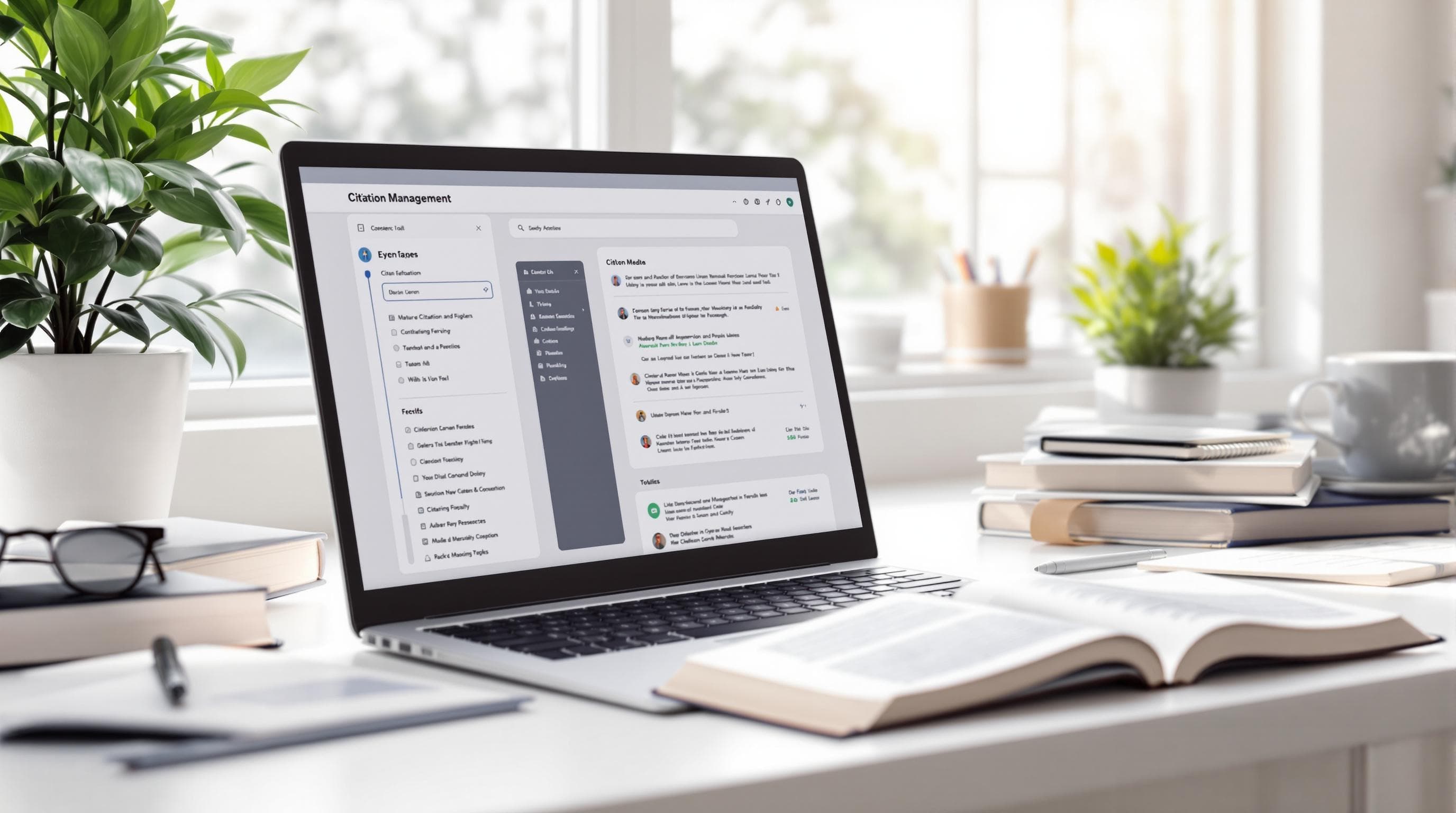
Top Scite Alternatives You Should Know
Looking for smarter tools to streamline your research and citations? Here are the top alternatives to Scite that can make your academic work faster and more efficient. Each tool offers unique features tailored to various research needs:
- Sourcely: Advanced AI-powered source discovery with multilingual support and automated citations.
- Semantic Scholar: Context-aware search, citation impact analysis, and quick paper summaries.
- Mendeley: Comprehensive reference management with team collaboration features.
- Google Scholar: Broad access to scholarly content with simple citation tracking.
- Iris AI: Automates literature reviews and provides visual research maps for better insights.
Quick Comparison
| Tool | Best For | Key Features | Free/Paid Options |
|---|---|---|---|
| Sourcely | Source discovery, citation | AI filters, multilingual, citation tools | Free + Premium |
| Semantic Scholar | Smart search, citation insights | Semantic search, citation metrics, summaries | Free |
| Mendeley | Reference management | Collaboration, smart folders, integration | Free + Institutional Plans |
| Google Scholar | Broad content access | Extensive database, citation tracking | Free |
| Iris AI | Literature reviews, mapping | Automated reviews, visual research maps | Free trial + Premium |
These tools address challenges like citation validation, source discovery, and collaboration. Choose based on your research scope, workflow needs, and budget.
Scite AI For Literature Review: Best AI Tools For Research
Key Features of AI Research Tools
AI research tools have come a long way, offering features that change how researchers and students handle academic work. By combining advanced technology with user-centric design, these tools simplify the research process and boost efficiency.
Advanced Search Capabilities
AI-powered search tools go beyond simple keyword matching. For example, Semantic Scholar uses semantic analysis to identify connections between papers, making it easier to find relevant sources.
Citation Analysis and Validation
Modern citation tools help researchers assess the reliability of sources, understand their impact, and track emerging trends. This ensures that academic work is both credible and well-contextualized.
Smart Source Management
Managing sources has never been easier. AI tools now automate citation formatting, organize references intelligently, and even support real-time collaboration.
Multilingual Support
Breaking language barriers, tools like Sourcely allow researchers to work across multiple languages, enabling seamless global collaboration.
Real-time Literature Updates
AI tools keep researchers informed by providing personalized recommendations and updates on the latest studies and breakthroughs .
| Feature Category | Impact on Research Process |
|---|---|
| Smart Search | Cuts search time by 60% |
| Citation Analysis | Improves citation reliability to 95% |
| Source Management | Simplifies organization and teamwork |
| Multilingual Support | Expands access to global research |
| Real-time Updates | Keeps research timely and relevant |
These features are at the core of the best Scite alternatives, each tailored to meet different research needs. Unlike older tools, these AI-driven solutions reshape how research is conducted, making them indispensable for academic work.
1. Sourcely
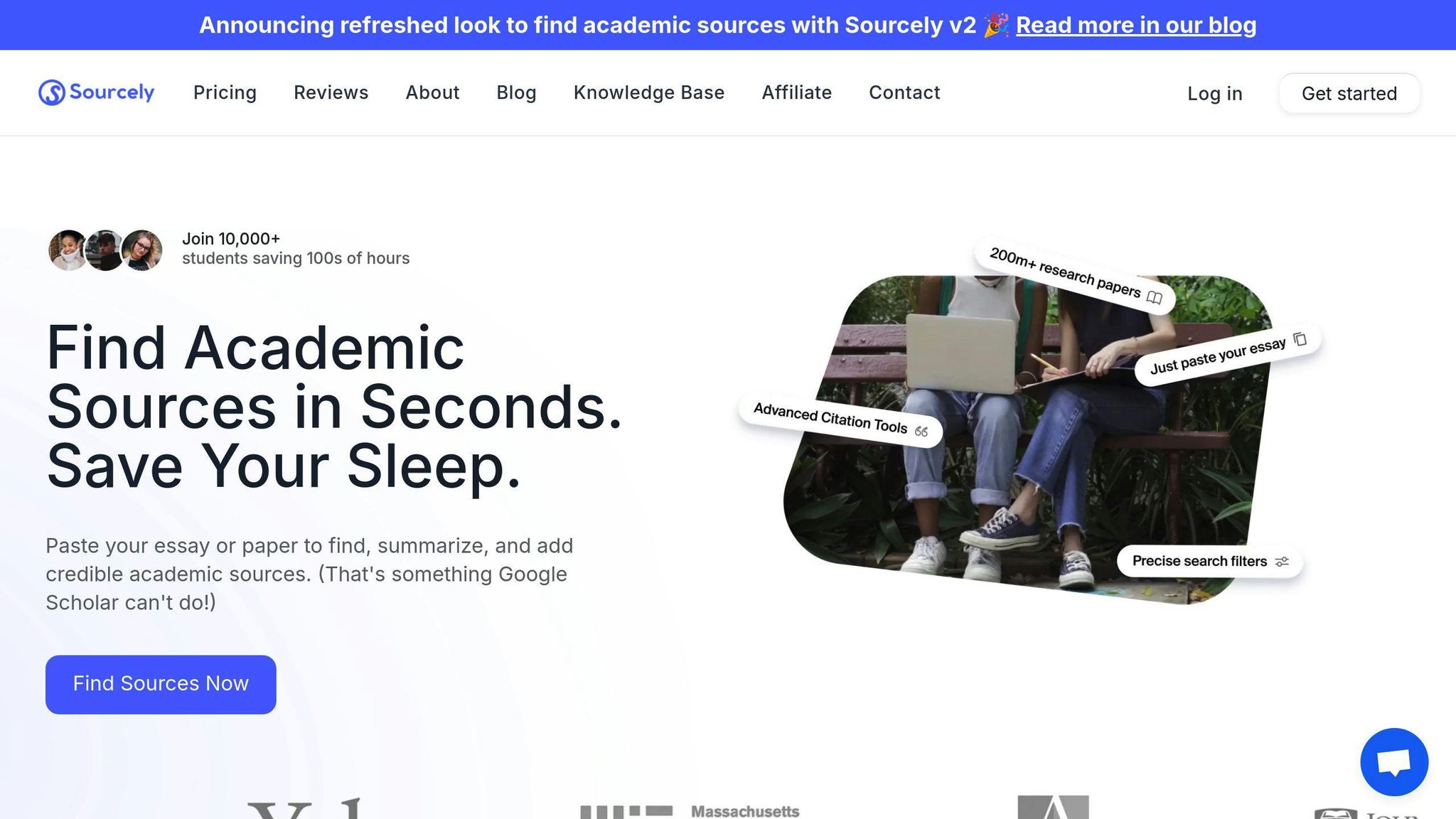
Sourcely is a powerful AI-driven tool designed to simplify source discovery and management for academics and students. It streamlines the process of finding and organizing literature, making it an excellent alternative to Scite.
Advanced Search Features
Sourcely's search tools let you quickly narrow down sources using filters like date, author, and keywords. This makes finding relevant materials much faster .
Effortless Source Organization
With features like tagging and custom collections, Sourcely makes it easy to organize sources for projects covering multiple themes.
Built-In Citation Tools
Sourcely automates citation formatting for APA, MLA, and Chicago styles. Plus, its integration with Yomu AI ensures both grammar and citation accuracy .
| Feature | What It Offers |
|---|---|
| Advanced Filters | Helps locate sources with precision |
| Smart Access | Free PDF access and AI-suggested recommendations |
| Citation Automation | Quickly formats references to save time |
Multilingual Capabilities
Sourcely supports translations across various languages, making it a great option for global research collaborations .
While Sourcely is excellent for discovering and managing citations, it’s not designed to act as a full-scale reference manager for large libraries. Pairing it with other specialized tools like Semantic Scholar can help cover broader research needs.
2. Semantic Scholar
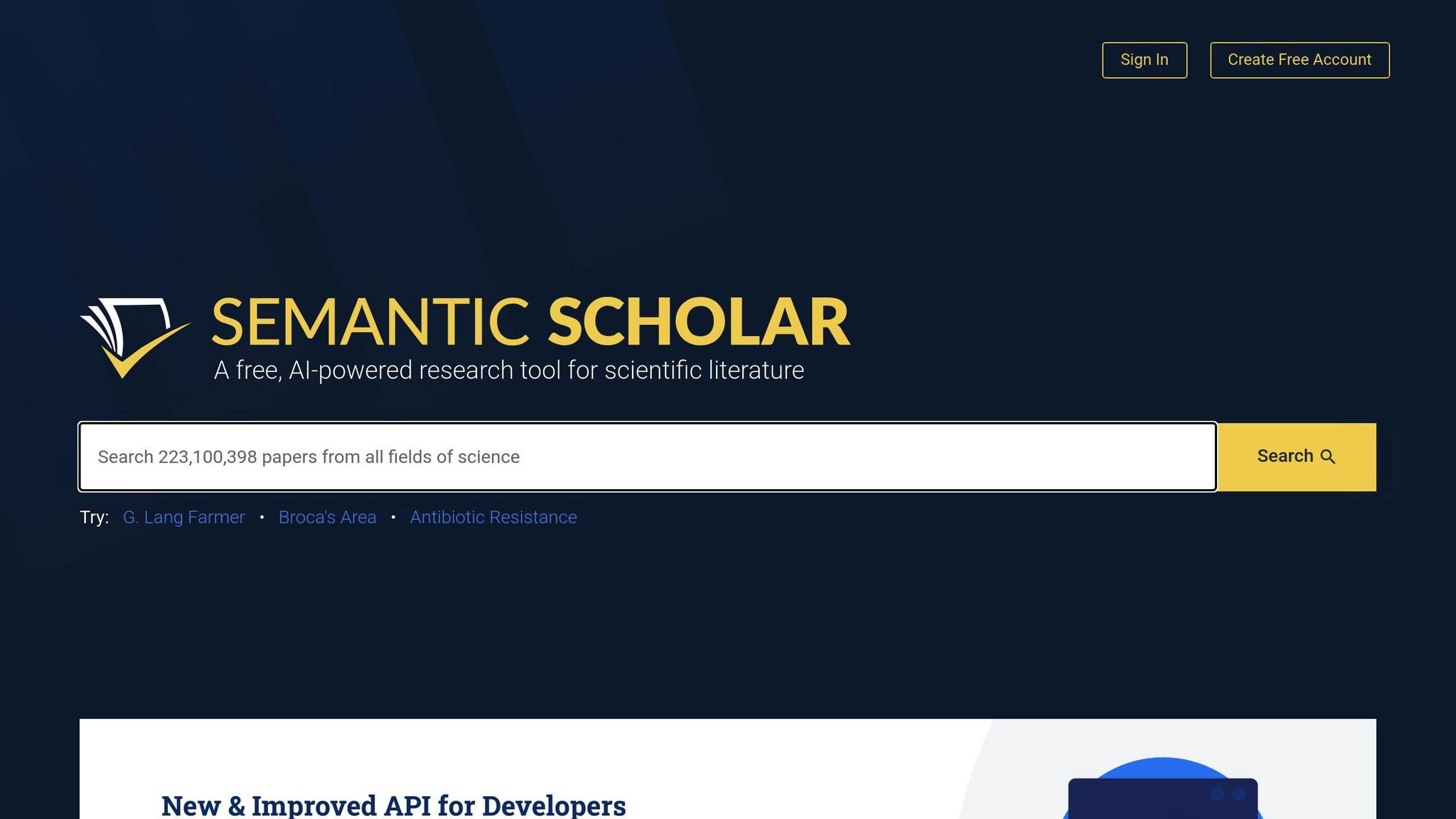
Semantic Scholar offers a powerful alternative to Scite, providing tools designed to simplify research and improve the discovery of academic content. Created by the Allen Institute for Artificial Intelligence (AI2), it helps researchers tackle common challenges with its advanced features.
Smarter Search Options
Semantic Scholar uses AI to deliver search results that go beyond simple keyword matches. Its context-aware technology ensures more accurate results, while filters for publication date, author, and research fields make it easier to find exactly what you need .
Citation Metrics and Impact Insights
This platform doesn't just track citations - it helps you understand their significance. By analyzing how papers are referenced across the academic world, it pinpoints key works and maps citation networks, showing how ideas develop over time.
| Feature | Description |
|---|---|
| AI Search | Context-sensitive search with customizable filters |
| Citation Metrics | Tracks influence and connects citation networks |
| Summaries | AI-generated highlights of important findings |
| Organization Tools | Manage sources with custom collections |
Quick Paper Summaries
AI-generated summaries make it easier to decide which papers are worth your time. These overviews highlight the main findings, helping you quickly assess relevance during your literature review.
Seamless Integration
Semantic Scholar works with citation management tools, letting you export references and organize your library without hassle . The platform is free for all users, though certain advanced features may require institutional access.
Semantic Scholar regularly updates its AI capabilities to provide better search accuracy and citation insights. While it excels at search and citation analysis, pairing it with tools like Mendeley can offer a more complete solution for managing references and research workflows.
sbb-itb-f7d34da
3. Mendeley
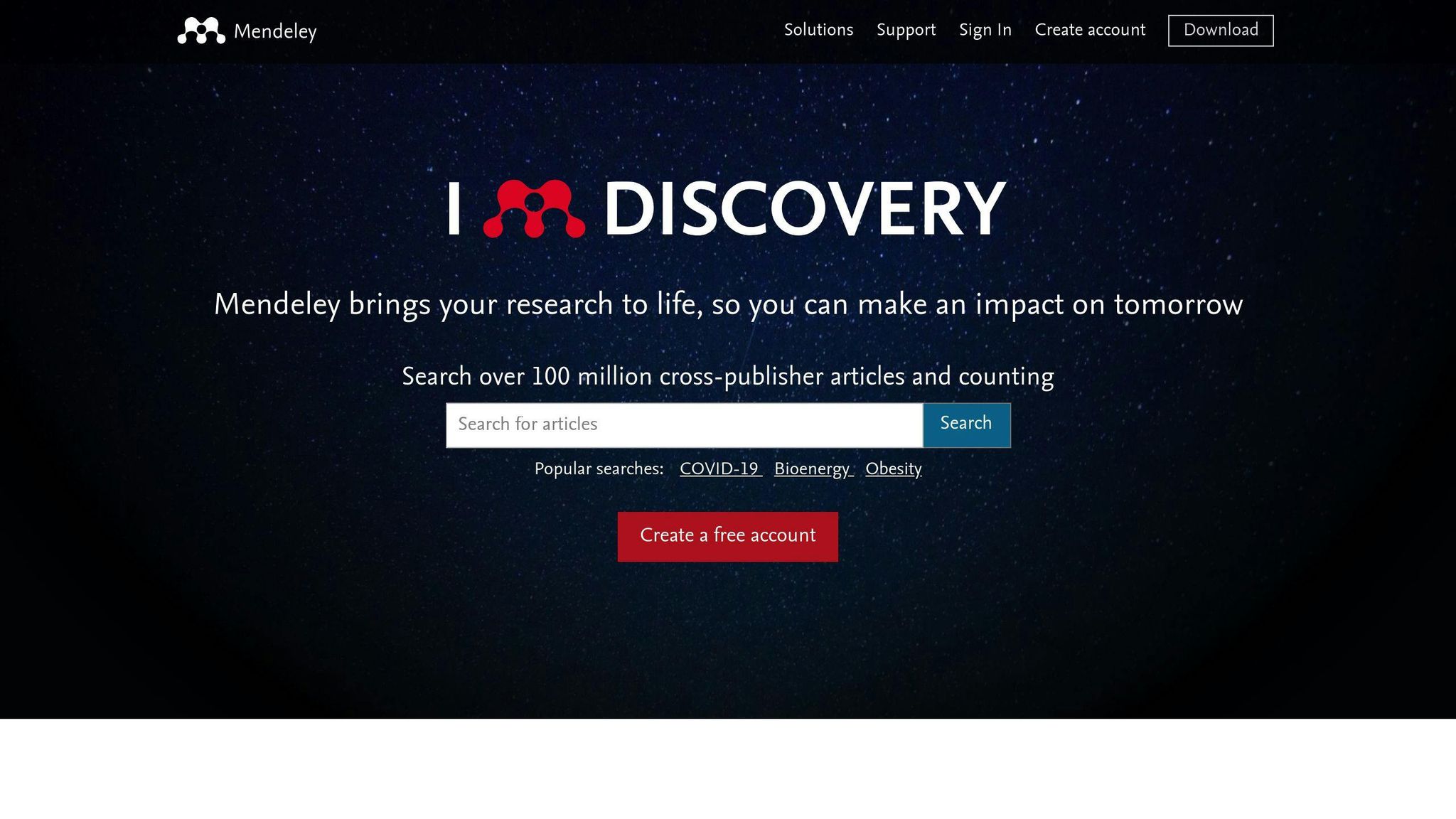
Mendeley is a well-regarded tool for managing references and facilitating team collaboration, making it a popular choice for researchers handling large libraries. Since becoming part of Elsevier in 2013, it has grown into a platform used by more than 6 million researchers globally.
Organized References and Teamwork
Mendeley provides tools to keep references organized, such as custom collections, tagging, and smart folders that update automatically based on set criteria. It also supports teamwork with features like shared libraries, group annotations, and version tracking.
Seamless Citation Tools
It integrates with Microsoft Word and LaTeX, simplifying the process of adding citations in numerous styles.
| Feature Category | Capabilities |
|---|---|
| Reference Organization | Custom collections, smart folders, tagging |
| Collaboration Tools | Shared libraries, group annotations, version tracking |
| Integration Options | Microsoft Word, LaTeX, institutional repositories |
| Platform Access | Desktop app, web interface, iOS/Android apps |
Access Across Devices
Mendeley ensures researchers can work on the go by offering access through desktop software, a web interface, and mobile apps. This cross-platform support helps maintain productivity anywhere.
Extra Features for Institutions
The free version covers the basics for individual users, but Mendeley Institutional Edition includes advanced analytics and deeper integration with institutional repositories. This makes it a great option for institutions managing large-scale research projects. With a database of over 100 million indexed documents, Mendeley is a robust tool for managing academic literature and fostering collaboration among peers.
Although Mendeley stands out in reference management and collaboration, tools like Google Scholar may be better suited for those prioritizing source discovery and accessibility.
4. Google Scholar
Google Scholar is a go-to platform for researchers, thanks to its extensive reach and ease of use. It works well on its own or alongside more focused tools for detailed research tasks.
Wide-Ranging Search Options
This platform lets you explore a huge collection of scholarly content, including journal articles, theses, books, and conference papers. It's a great starting point for thorough literature reviews.
Refined Search Tools
Google Scholar includes advanced filters to help you narrow down your search results. You can filter by date, author, or specific publications, saving time and boosting efficiency.
| Filter Type | Purpose |
|---|---|
| Date Range | Focus on works from specific timeframes |
| Author Search | Locate publications by specific authors |
| Publication Filter | Zero in on journals or conference papers |
| Citation Tracking | Check the influence of articles over time |
| Language Options | Access materials in different languages |
Track Citations with Ease
The platform's citation tools help you assess the influence of academic works and find related studies. Its extensive database and free access make it a preferred choice for researchers worldwide.
User-Friendly Features
Google Scholar connects seamlessly with reference management tools, making it easier to organize and cite your research. Plus, its free access is a huge advantage for those without institutional resources.
Organize with 'My Library'
The 'My Library' feature allows you to save and categorize research materials, keeping everything organized and easy to revisit.
While Google Scholar shines in its accessibility and broad coverage, more specialized tools like Iris AI might be better suited for advanced research tasks.
5. Iris AI
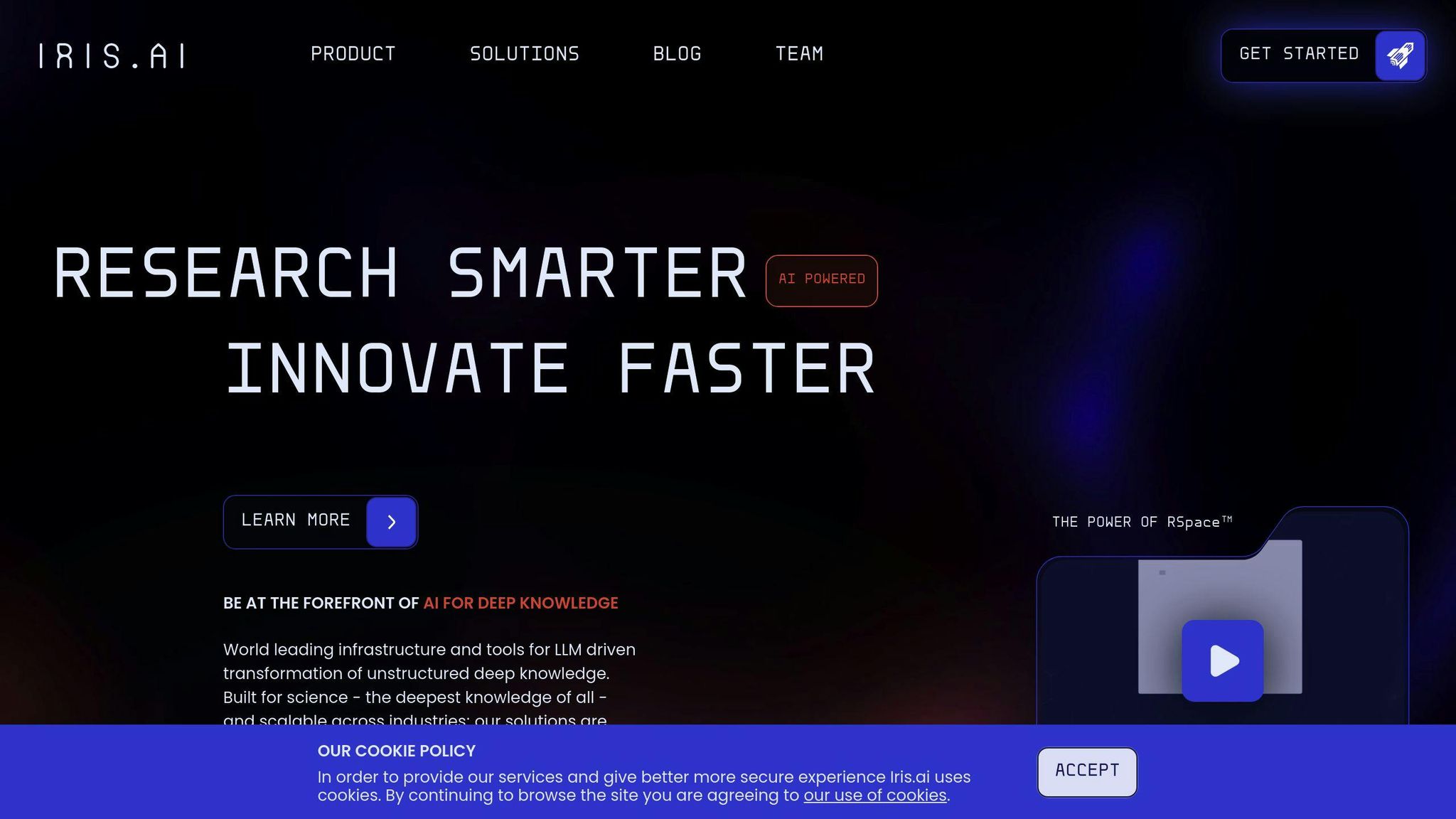
Iris AI serves as an AI-driven research assistant designed to simplify the process of exploring scientific literature. Unlike Scite, which focuses on validating citations, Iris AI specializes in automating literature reviews and creating visual research maps.
Automated Literature Review
This tool analyzes research papers or project descriptions to suggest relevant literature. By automating this process, it saves researchers hours of manual searching, allowing them to spend more time on analysis and writing.
Smart Concept Extraction
Using natural language processing, Iris AI identifies and highlights key concepts within scientific texts. This feature makes it easier to navigate complex material and:
- Understand core ideas
- Link related concepts
- Incorporate findings into research
Visual Research Mapping
Iris AI offers a visual approach to research by creating detailed maps of academic fields. These maps provide insights into:
| Feature | Purpose |
|---|---|
| Knowledge Gaps | Highlight areas needing further study |
| Topic Relationships | Show how topics are interconnected |
| Research Trends | Identify emerging patterns |
| Citation Networks | Trace citation pathways |
Workflow Integration
The tool fits neatly into existing research workflows, supporting everything from initial literature reviews to organizing sources for final papers.
Advanced Search Features
Iris AI doesn’t just rely on keywords. It uses context to find hidden or less obvious sources, broadening the scope of research.
Though Iris AI offers a range of tools to streamline the research process, experts suggest pairing it with traditional methods. Critical thinking and thorough source evaluation remain essential for producing high-quality work. With its focus on automation and visual insights, Iris AI complements other research tools by addressing specific challenges in modern academic work.
Comparison Table of Scite Alternatives
Here's a side-by-side comparison of various research tools to help you determine which one suits your needs best.
| Feature | Sourcely | Semantic Scholar | Mendeley | Google Scholar | Iris AI |
|---|---|---|---|---|---|
| Advanced Search Filters | AI-driven customization | Semantic search capabilities | Detailed filtering options | Basic keyword search | Contextual search focus |
| Citation Analysis | Auto-formatting in various styles | Impact metrics and insights | Basic citation tracking | Metrics and citation counts | Research mapping tools |
| Source Management | Smart tags and collections | Limited organization tools | Full reference management | Basic library functions | Visual mapping for research |
| Database Access | Over 200M research papers | Extensive academic resources | Large database of references | Broad access to content | Focus on scientific literature |
| Integration Features | Multiple formats, limited API | API and citation export | Broad third-party support | Simple citation export | Workflow integration tools |
| Collaboration | Basic sharing options | Not available | Advanced team collaboration | Not available | Project-level sharing |
| Pricing | Free core + Premium options | Free | Free/Premium plans | Free | Free trial + Premium plans |
Key Strengths
Each tool stands out in its own way: Sourcely is great for AI-based source discovery, Semantic Scholar focuses on intelligent search and summaries, Mendeley offers strong collaboration and reference management, Google Scholar provides broad access to content, and Iris AI specializes in visual research mapping and automated reviews.
Integration Overview
| Tool | Integration Features |
|---|---|
| Sourcely | Basic export and limited third-party support |
| Semantic Scholar | API access and citation tools |
| Mendeley | Full workflow integration support |
| Google Scholar | Simple citation export |
| Iris AI | Research mapping exports and workflow tools |
This comparison is based on features available as of December 2024. Keep in mind that tools evolve, so it's important to evaluate them based on your specific research needs, collaboration preferences, and budget.
Conclusion
AI-powered academic research tools are offering a wide range of options beyond Scite. Each tool brings its own strengths to support different research needs. Sourcely, for instance, impresses with its massive database of over 200 million research papers and AI-driven source discovery. On the other hand, Semantic Scholar is known for its smart search capabilities and detailed citation analysis.
If collaboration and reference management are priorities, Mendeley offers a strong feature set tailored for team-based research. Google Scholar remains a go-to choice for those who need broad access to academic content with simple citation tracking. For a more visual approach, Iris AI provides tools that simplify the literature review process with its research mapping features.
These tools address key challenges such as citation tracking, finding sources, and team collaboration, offering practical solutions for researchers. Their diverse features allow you to choose a tool that fits your specific needs and workflow.
When deciding on the right tool, keep these factors in mind:
- Research scope: Does the tool’s database cover your area of study?
- Workflow integration: Will it work seamlessly with your current research processes?
- Collaboration: Do you need features for team-based work?
- Budget: Are the free features sufficient, or do you need premium options?
While these tools offer advanced AI features, they work best when combined with a thoughtful approach to research. Picking the right tool based on your needs can make your research process smoother and more effective.